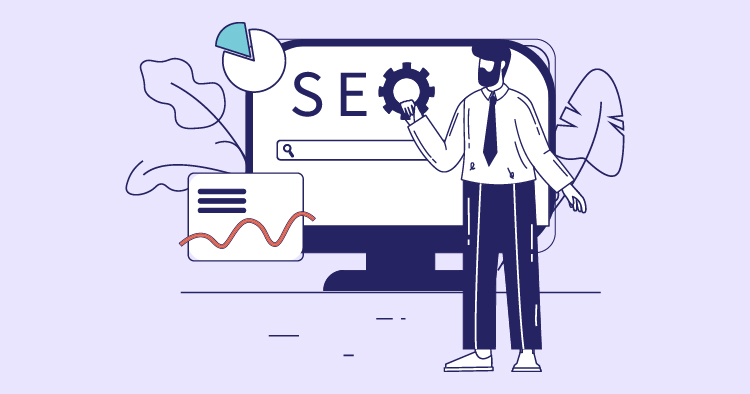Search engine optimization, or SEO, is vital for anyone looking to market their business online. It’s about making your website more visible and attractive to search engines like Google. There are two main types of SEO: on-page and off-page. On-page SEO is all about what’s on your website. This includes the content you write, the images you add, and even the behind-the-scenes coding. It’s about ensuring your site is accessible for search engines to understand and see as valuable.
On the other hand, off-page SEO is about everything you do away from your website to help your rankings. This could be getting other websites to link to yours or using social media to get the word out. This post will explore how off-page and on-page SEO differ, why both are necessary, and how using them together can boost your website’s search results.
Understanding SEO: The Basics
SEO, or Search Engine Optimization, is about making a website more visible in search engines like Google when people search for related products or services. The aim is to get more organic or non-paid traffic to your site. This involves a mix of technical adjustments and creative design to boost rankings, draw in visitors, and build online awareness. It’s a vital part of modern digital marketing strategies.
SEO is critical for being noticed online. Nowadays, most people use search engines to find what they need. If your website appears higher in search results, it could mean the difference between success and obscurity. A website optimized well will attract visitors looking for what you offer, which can lead to more leads and sales. Even the most beautifully designed website might go unnoticed if your SEO isn’t up to par.
What is On-Page SEO?
On-page SEO is fine-tuning the content and code of individual web pages to climb higher in search rankings and attract more relevant traffic. Unlike off-page SEO, which deals with external links and other factors outside your site, on-page SEO focuses on what’s on your site. It’s about ensuring everything on your website helps it show up as clearly as possible to both search engines and users.
On-page optimization includes the actual content, the meta tags like title tags and meta descriptions, the structure of your URLs, and how you link content within your site. Each of these elements helps search engines figure out your content and decide if it’s helpful to people searching. By optimizing these aspects, you make it easier for search engines to read, index, and understand your pages.
The Pillars of On-Page SEO
Relevant quality content is central to on-page SEO. Search engines rank applicable, well-written content that matches users’ needs. If your content meets users’ needs, they’ll likely spend more time with it, which is a good sign for search engines. Regularly updating your content also keeps it relevant and can boost your rankings.
Title tags and meta descriptions are small but mighty HTML elements that summarize your page’s content. The title tag is what people see as the headline in search engine results, and it’s essential for usability, SEO, and when sharing on social media. Meta descriptions are brief descriptions that search engines might show in search results to give people a preview of what’s on the page.
Struggling with Digital marketing? Book Your Free Strategy Session!
- 30-Minutes Session
- Expert Insights
- Data-Driven approach
- Optimized Strategies for Your Goals
Headers and a good structure make your content easier to read and help search engines understand the main points. Simple URLs that include keywords make your pages more straightforward to use and find. An internal linking strategy means you link to other pages on your site using relevant text, which helps search engines find more of your content and understand how it all links together.
The Role of Keywords in On-Page SEO
Choosing the right keywords is an essential but crucial part of on-page SEO. People type keywords into search engines, and including these in your content can help you appear in search results. Researching and finding the keywords your target audience uses the most is vital.
Where and how often you use keywords matters for on-page SEO. They should fit naturally into your content, titles, headings, and meta descriptions. But be careful not to overdo it; too many keywords can make your content hard to read and might even penalize you by search engines. The key is to use keywords to improve your content without overloading it.
Enhancing User Experience for On-Page SEO
A fast-loading website is crucial for keeping visitors’ attention. If your site is slow, people might leave before they even get a chance to see what you offer. To load your website faster, you can compress images, use browser caching, and improve server response times. Your website must also look good and work well on smartphones and tablets. When ranking, Google prioritizes mobile-friendly sites, so ensuring your site is optimized for mobile devices is vital for better search engine placement.
Your website should be easy to navigate, with a clear structure that helps visitors find what they’re looking for without getting lost. This includes using headings that stand out, organizing your content well, and having an easy design for the eyes. To get visitors more involved, add elements inviting them to take action, like buttons that stand out, interactive features, and content that’s so good they want to comment on or share with others. When users interact with your site, it tells search engines it has valuable content, which can help improve your position in search results.
Technical Aspects of On-Page SEO
Keeping user data safe is essential, and that’s where HTTPS comes in. It’s a more secure version of HTTP that scrambles data as it moves between the browser and the server. Google has said that using HTTPS can help your site rank better. Plus, it shows visitors that you care about their privacy and protect their information seriously.
Pictures and videos can make your site more appealing, but if they’re not set up right, they can slow your site. Make sure to reduce the size of your images without making them look worse, and set up your site so that these visuals adjust to different screen sizes. Also, add text descriptions to your pictures (called alt text) to help search engines understand what they’re about and to make your site more accessible to people who can’t see the images. Optimizing these parts of your site helps search engines and visitors, which is good for your site’s SEO.
What is Off-Page SEO?
Off-page SEO involves actions taken outside your website to improve its rankings in search engine results. It’s different from on-page SEO, which is all about the optimizations you make on your site. Off-page SEO mainly involves getting other websites to link to yours. Search engines see these links as signs that your content is high-quality.
Backlinks are a big part of off-page SEO, but it’s not just about them. Off-page SEO also includes using social media, writing guest blog posts, and working with influencers. The idea is to spread the word about your brand online and build a reputation that search engines see as trustworthy. The more reputable sites link to you, the more valuable search engines think your content is, which can lead to higher rankings.
The Importance of Backlinks in Off-Page SEO
Not all backlinks are the same. Search engines look at the quality of the links that point to your site. A link from a well-known, authoritative site is better than one from a site that’s not very popular. Search engines consider how related the linking site is to your content, where the link is placed, the words used in the link, and whether the link is followed. Focus on getting links from high-authority sites relevant to your work.
Getting good backlinks requires a thoughtful approach. Create content that’s so good that others want to link to it. Contact influencers and respected websites in your industry to share your work or collaborate on something. Writing guest posts for well-known sites can also get you valuable links. Keep an eye on your links to ensure they’re still working and that you don’t have any wrong links that could hurt your search engine rankings.
Social Signals and Off-Page SEO
Social media’s influence on search engine optimization (SEO) is substantial, even if it’s not a direct ranking factor. When people share your content on platforms like Facebook, Twitter, or LinkedIn, it doesn’t just sit there—it gets noticed. These shares increase your content’s visibility, leading to more people visiting your site and potentially linking to your content. These backlinks and the traffic they bring are essential for off-page SEO.
Making the most out of social media for SEO is all about engagement. Share content that adds value and gets people talking. A solid social media presence can help your content travel further, leading to more backlinks—a big plus for your website’s SEO. Using hashtags wisely, teaming up with influencers, and jumping into trending conversations can make your content more visible.
Observing how your social media content performs is smart. It tells you what works with your audience, helping you fine-tune your strategy to support your off-page SEO goals.
The Power of Guest Posting and Content Marketing
Guest blogging is like making new friends in the digital world. You can showcase your expertise by writing great articles for other respected field sites and snagging some backlinks. Search engines love backlinks from credible sources—they see them as a thumbs-up for your content.
Content marketing isn’t just about what you put on your site. It’s about spreading valuable content far and wide. Whether it’s blog posts, visuals, videos, or ebooks, if it’s good stuff, it can attract attention and get people to link back to you. That’s a win for your off-page SEO.
Remember, it’s the quality of your content that matters. If you nail that, you’re more likely to get shares and links, boosting your off-page SEO.
Local SEO and Off-Page Optimization
For local businesses, being easy to find online is critical. Make sure your business shows up where it counts, like Google My Business, Yelp, and Bing Places. Accurate listings can drive traffic and boost your ranking in local search results.
Want to shine in local SEO? Get your customers to leave good reviews and ensure you respond to them. Reviews aren’t just crucial for attracting new customers and helping with local search rankings. Getting your business into local directories is another way to get noticed.
Struggling with Digital marketing? Book Your Free Strategy Session!
- 30-Minutes Session
- Expert Insights
- Data-Driven approach
- Optimized Strategies for Your Goals
Keeping your business’s name, address, and phone number consistent across all listings is critical. It helps search engines—and customers—trust that you are who you say you are, which can lead to better local search rankings.
The Influence of Brand Mentions on Off-Page SEO
Even when your brand is mentioned without a link, it’s still good news for SEO. Search engines are intelligent, so they can pick up on these mentions and see them as a sign that your brand is legit and getting attention. This can help improve your search rankings.
To get people talking about your brand, post content worth sharing, interact with your audience on social media, and get involved in community events or discussions. The more you promote your brand, the more mentions you’ll get.
Keep an eye on where and how your brand is mentioned online. When someone says something good, show some love—thank them or share the mention. This acknowledges the mention and can inspire more chatter about your brand, boosting your off-page SEO efforts even further.
Combining On-Page and Off-Page SEO
On-page and off-page SEO are essential components of a solid SEO strategy. On-page SEO focuses on what you can do on your website to improve rankings, such as optimizing content and improving meta tags. On the other hand, off-page SEO deals with activities outside your website, like earning backlinks and generating social media buzz, to enhance your site’s reputation and authority.
To create an effective SEO strategy, it’s essential to understand how these two aspects complement each other. On-page SEO makes your site more user-friendly and more accessible for search engines to understand. This involves crafting quality content and optimizing your images and meta tags. Off-page SEO continues the effort by helping to establish your site’s credibility through links from other reputable sites.
For the best outcomes, combine on-page and off-page SEO tactics. Start optimizing your site internally, then promote it externally to build its reputation. This will make search engines see your site as relevant and trustworthy, leading to better rankings.
Measuring the Impact of On-Page and Off-Page SEO
Understanding the effectiveness of your SEO strategies is crucial, and tools like Google Analytics and Google Search Console are invaluable for this. They help you track your site’s traffic and search performance. Tools like Ahrefs, SEMrush, and Moz offer more detailed insights into your backlinks and keyword performance.
Keep an eye on critical metrics such as organic traffic, bounce rate, conversion rate, page load time, and the quality of your backlinks. These metrics help you gauge the success of your SEO efforts. For instance, many visitors from search engines suggest your SEO is working well. If you see any declines in these areas, it’s time to examine your strategies and make necessary adjustments.
Regular monitoring and adjusting your SEO strategies based on these metrics can help you maintain a solid online presence and improve your search engine rankings.
Common Mistakes to Avoid in On-Page and Off-Page SEO
It’s easy to fall into the trap of over-optimization or keyword stuffing in on-page SEO. While keywords are important, too much can backfire and hurt your search rankings. Search engines prefer content that feels natural and provides value to the reader. So, focus on quality content with a natural use of keywords.
For off-page SEO, avoid low-quality backlinks and any tactics that seem spammy. Quality backlinks from respected sites are important because they influence how search engines perceive your site’s authority. Avoid shortcuts like buying links or participating in link schemes, as these can lead to search engine penalties.
Avoiding these common mistakes can lead to a more effective SEO strategy. Keep your content engaging and natural, and build a robust and legitimate backlink profile. This approach helps you stay in search engines’ good graces, enhances user trust, and can lead to better engagement and conversions.
Final Thoughts
Boosting your website’s online presence requires a good mix of on-page and off-page SEO. Think of on-page SEO as the groundwork for a site that’s easy to use and that search engines love. Off-page SEO is about building up your site’s reputation and authority from the outside. It’s not a matter of picking one over the other; they’re both critical. They work hand in hand to lift your website higher in search results. Combining on-page and off-page SEO in your strategy allows you to set up a robust and balanced approach. This increases your site’s traffic and cements your place in the digital world. Paying attention to on-page and off-page SEO is crucial for lasting success.



